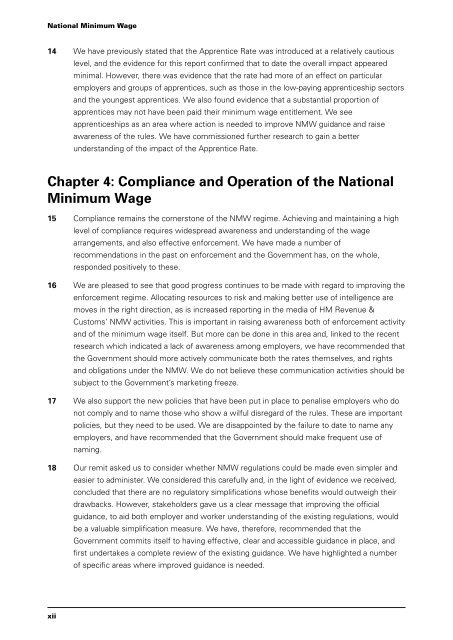National Minimum Wage
National Minimum Wage
National Minimum Wage
You also want an ePaper? Increase the reach of your titles
YUMPU automatically turns print PDFs into web optimized ePapers that Google loves.
<strong>National</strong> <strong>Minimum</strong> <strong>Wage</strong><br />
14 We have previously stated that the Apprentice Rate was introduced at a relatively cautious<br />
level, and the evidence for this report confirmed that to date the overall impact appeared<br />
minimal. However, there was evidence that the rate had more of an effect on particular<br />
employers and groups of apprentices, such as those in the low-paying apprenticeship sectors<br />
and the youngest apprentices. We also found evidence that a substantial proportion of<br />
apprentices may not have been paid their minimum wage entitlement. We see<br />
apprenticeships as an area where action is needed to improve NMW guidance and raise<br />
awareness of the rules. We have commissioned further research to gain a better<br />
understanding of the impact of the Apprentice Rate.<br />
Chapter 4: Compliance and Operation of the <strong>National</strong><br />
<strong>Minimum</strong> <strong>Wage</strong><br />
15 Compliance remains the cornerstone of the NMW regime. Achieving and maintaining a high<br />
level of compliance requires widespread awareness and understanding of the wage<br />
arrangements, and also effective enforcement. We have made a number of<br />
recommendations in the past on enforcement and the Government has, on the whole,<br />
responded positively to these.<br />
16 We are pleased to see that good progress continues to be made with regard to improving the<br />
enforcement regime. Allocating resources to risk and making better use of intelligence are<br />
moves in the right direction, as is increased reporting in the media of HM Revenue &<br />
Customs’ NMW activities. This is important in raising awareness both of enforcement activity<br />
and of the minimum wage itself. But more can be done in this area and, linked to the recent<br />
research which indicated a lack of awareness among employers, we have recommended that<br />
the Government should more actively communicate both the rates themselves, and rights<br />
and obligations under the NMW. We do not believe these communication activities should be<br />
subject to the Government’s marketing freeze.<br />
17 We also support the new policies that have been put in place to penalise employers who do<br />
not comply and to name those who show a wilful disregard of the rules. These are important<br />
policies, but they need to be used. We are disappointed by the failure to date to name any<br />
employers, and have recommended that the Government should make frequent use of<br />
naming.<br />
18 Our remit asked us to consider whether NMW regulations could be made even simpler and<br />
easier to administer. We considered this carefully and, in the light of evidence we received,<br />
concluded that there are no regulatory simplifications whose benefits would outweigh their<br />
drawbacks. However, stakeholders gave us a clear message that improving the official<br />
guidance, to aid both employer and worker understanding of the existing regulations, would<br />
be a valuable simplification measure. We have, therefore, recommended that the<br />
Government commits itself to having effective, clear and accessible guidance in place, and<br />
first undertakes a complete review of the existing guidance. We have highlighted a number<br />
of specific areas where improved guidance is needed.<br />
xii


